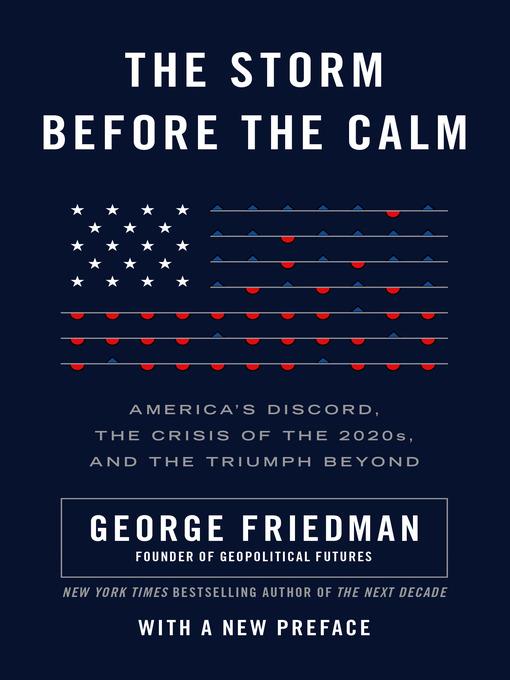
The Storm Before the Calm
America's Discord, the Coming Crisis of the 2020s, and the Triumph Beyond
کتاب های مرتبط
- اطلاعات
- نقد و بررسی
- دیدگاه کاربران
نقد و بررسی

December 23, 2019
The vitriol of the Trump era masks crises in our economy and governing institutions that will deepen before resolving themselves, according to this probing and ultimately hopeful diagnosis of America’s discontents. Friedman (The Next 100 Years), chairman of the forecasting organization Geopolitical Futures, argues that the country is ending the third installment of a recurring 80-year cycle of stress and reform in the federal government—the first ended when the Civil War established federal supremacy over states, the second when the New Deal and WWII cemented federal control over the economy; the third has been caused by a federal bureaucracy too “vast” and tangled to solve problems—and the turn of a 50-year economic cycle currently dominated by investor-friendly economics. These coinciding cycles, he contends, will cause upheaval in the 2020s before the 2030s stabilize around a new regime of efficient government and a fairer economy. Though Friedman’s cycles feel artificial and his prophecies Nostradamian (“In 2024 a new president will emerge who represents the values of the declining era”), they frame cogent analyses of America’s dysfunctions, including the demoralizing decline of middle-class incomes and working-class whites’ resentment of an arrogant ruling technocracy formed by elite universities they can’t get into. Crystal ball-gazing aside, Friedman offers a lucid, stimulating assessment of which way the wind is blowing. Agent: Jim Hornfischer, Hornfischer Literary Management.

January 15, 2020
The Austin-based forecaster argues that "impersonal forces" will drive events in the 2020s, "one of the more difficult periods" in American history, but prosperity will follow. Friedman (Flashpoints: The Emerging Crisis in Europe, 2015, etc.), an adviser to corporations and government and the founder of Geopolitical Futures, has a cyclical view of American history, which argues that predictable cycles of "crises, order, and reinvention" have shaped outcomes since the birth of the nation. We are "simply passengers on the American roller coaster," he writes matter-of-factly. Two major cycles control "actors and events": an institutional cycle occurring every 80 years (marked in the past by the Revolutionary War, the Civil War, and World War II) and guiding the relationship between the federal government and other parts of the nation; and a socio-economic cycle, which changes the dynamic of the U.S. economy and society at 50-year intervals and has produced the industrial class, baby boomers, and the middle class. Friedman predicts these complex forces will converge in the 2020s to "destabilize" American life and begin a "period of failures" marked by indifference to politics, low growth in productivity, and increasing unemployment. The 2030s will be a murkily described "period of creation" that will "redefine" the social landscape and ameliorate the problem of dysfunctional federal government by introducing military governing principles (subordinates do not deviate from the commander's intent). Many readers will balk at the author's too-neat cycles and the notion that leaders do not play a major role in shaping events. In support of his theorizing, he offers a sharp analysis of American life, especially the roots of the knack for reinvention that allows the nation to start over after crises. Americans invented their country, he writes, and lacking shared history and culture, "invented themselves." Friedman also discusses the nation's reluctance to accept its responsibilities as the "sole world power" and the tensions between its technocratic and industrial working classes. A provocative, idea-filled burst of prognostication.
COPYRIGHT(2020) Kirkus Reviews, ALL RIGHTS RESERVED.

























دیدگاه کاربران